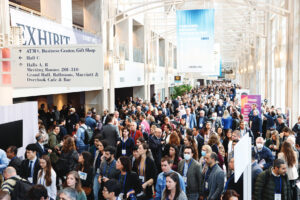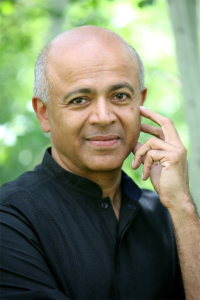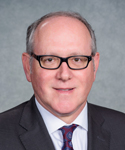 PHILADELPHIA—Abraham Verghese, MD, best-selling author and infectious disease specialist, told a packed hall at the opening ceremony of ACR Convergence that he didn’t need to look far to find heroes not much different from the protagonists he has written about in his novels, which blend medical mystery with the passions and tragedies of human existence.
PHILADELPHIA—Abraham Verghese, MD, best-selling author and infectious disease specialist, told a packed hall at the opening ceremony of ACR Convergence that he didn’t need to look far to find heroes not much different from the protagonists he has written about in his novels, which blend medical mystery with the passions and tragedies of human existence.
“The heroes and heroines of this story that we’ve all lived through are all of you,” Dr. Verghese, professor of medicine, vice chair for the theory and practice of medicine, and Linda R. Meier and Joan F. Lane Provostial Professor, Stanford University, Department of Medicine, Stanford University, Palo Alto, Calif., said in his keynote address. “All of us have been, in a sense, heroic, because we’ve shown up.”
Dr. Verghese’s presentation came in a session that also featured an opening address by ACR President Kenneth Saag, MD, MSc, who touched on progress and challenges in the management of COVID-19, diversity, workforce shortages and mistrust in science and medicine.
Together, the talks struck a dramatic and uplifting note as the field of rheumatology continues to emerge from the pandemic to face an altered landscape, with new hurdles and new opportunities.
Keynote
Dr. Verghese invited the medical professionals listening to think of themselves as characters in a grand story akin to the monster-vanquishing Gilgamesh or the shark-hunting Quint in Jaws; they’ve had to stand up to the monster of COVID-19, made all the more frightening by its backdrop of political turmoil, the pain of George Floyd’s death in police custody and out-of-control wildfires in summer 2020.
“When I would read the statistics of the daily mortality by state, by county, by nation, I kept thinking about the monster being fed by human sacrifice every single day,” he said.
He showed pictures of some of the scores of medical staff who died during the pandemic after reporting for work during a time of danger and uncertainty. He recalled the tragedy of victims who had to die alone.
“I remember reading the logs of nurses talking about how they would actually try not to drink too much water so they wouldn’t have to go to the bathroom and disrobe in those early days when we didn’t quite know how this was spread,” Dr. Verghese said.
“We’ve all been touched,” he added. “We are, without a doubt, living through the story of our lives.”
The ending of the story, he said, may be surprising.
“It’s never the case that things go back exactly the way they were,” he said. “In fact, it’s always the case that we go to a new order, a new way of life.”
When all is said and done, history will give us all mixed reviews on how the pandemic has been handled. The “science was phenomenal,” he said, with the characterization of the virus and the development of a vaccine done on a pace that’s never been seen before.
But, he said, “I think history will be fairly harsh with us about our failure to have learned the lessons of history.” Elected leaders didn’t heed lessons from previous pandemics—lessons contained in seminal works like The Plague by Albert Camus, he said.
“For these times, we must all heed the call to adventure, and you have,” Dr. Verghese said. “We must find the tools and weapons never thought of before, and you’re doing that. We must have courage; we must have faith; we must tell our story. For this too shall pass.”
President’s Address
In his address, Dr. Saag said the rheumatology field rose to the challenge during the pandemic.
“The ACR tackled COVID head-on,” he said, adding that he was “indebted to my predecessors,” referring to past presidents Ellen Gravallese, MD, and David Karp, MD, PhD.
“We became a trusted national resource at a time critical in history,” Dr. Saag said.
While COVID-19 continues to pose special risks to immunocompromised patients, he said, it is beginning to feel as though the field is entering a phase beyond the pandemic, which brings new challenges.
“We now see non-clinical work as less constrained by time and space,” he said. “Many of our administrative and research staff and faculty, particularly in our academic, industry and government centers, view at least partially remote work as a key job benefit. While this no doubt improves work-life balance for some, it’s led to a stifling of the water-cooler discussion, which has challenged our ability to innovate.”
The Great Resignation has brought on a need for hiring quality new staff, “who have been very tough to find,” he said.
The ACR is situating itself to meet these challenges, he said. The structure of Board of Directors meetings now encourages “more intimate discussions.” And new ACR membership models will allow for small teams of healthcare providers to join. Live meetings will continue to be complemented by virtual options to encourage maximum attendance.
The RISE registry will continue to help with research, he added, indicating it now includes data equivalent to 3 million patients and 30 million visits.
The top challenge may be the rheumatology workforce shortage, with an estimated 40–50% of current U.S. rheumatologists expected to retire in the next 10 years, leading to a 25% reduction in the workforce.
“This constitutes an existential threat to our care for an increasing number of patients, resulting, in part, from a global silver tsunami,” Dr. Saag said. An ACR Workforce Solutions Committee is working on solutions to grow and sustain this workforce.
Burnout, limited interactions of trainees with scientists, demoralized scientists due to lost funding, and debt that limits career choices are all reasons for workforce shortages and low numbers of physicians doing scientific research, he said.
“Simply put, we need more funding, but in particular we must support those doing team science and translational research of greatest public health relevance,” he said.
The ACR is also working on diversity, equity, inclusion and accessibility issues with leadership development conferences, an ACR Convergence reception for under-represented medical professionals, and a new ACR subcommittee and diversity director, he said.
“We need to be a more representative specialty to enhance trust,” he said.
Rheumatologists also play a role in helping to dispel the mistrust of science that blossomed during the pandemic. Speaking out on the health impact of the overturning of Roe v. Wade, among other topics, is important for the ACR, but Dr. Saag said the College’s positions should be science based and not veer too far into the political.
“When society takes a wrong turn, and medical professionals go along, mistrust in medicine grows,” he said.
“Express your true opinions—if I can get my reticent patients in Alabama to take badly needed COVID vaccines, trust does matter. And our trusted expertise influences our patients’ actions,” he said. “Our lane, and the lanes of other medical organizations, are widening, and the ACR cannot and should not shy away from controversy. We should be doing this while representing our members fairly.”
Despite the challenges to medicine and science over the past three years, Dr. Saag said, “I’m an optimist even in these most polarized times.”
Thomas Collins is a freelance medical writer based in Florida.




